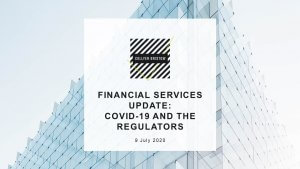- Banking & financial disputes
- Financial services

Shorter Reads
Brief update: Business Interruption Insurance – FCA files a Reply in the Test Case
We summarise key points from the FCA’s Reply filed in the business interruption insurance test case.
2 minute read
Published 13 July 2020
Key information
The FCA has filed a very extensive Reply[1] (35 pages) to the insurers’ Defences in its business interruption (BI) insurance test case, alleging broadly that the eight defendant insurers are seeking to deprive BI cover clauses of their plain and intended scope.
The FCA contends that insurers’ have adopted unduly restrictive meanings of particular words and approaches to proving the presence of COVID-19, none of which reflect what a reasonable person in the position of the parties would understand.
The lengthy Reply takes issue with a large number of the points made by the insurers about the correct interpretation of many examples of policy wording to be decided by the court and we summarise a few of the FCA’s points below.
When did the Government’s restrictions start impacting businesses?
The FCA maintains that there was interruption of (or interference with) business from at least 16 March 2020, when the Prime Minister announced that everyone should stop non-essential contact with others and avoid confined spaces, such as pubs and restaurants. This, they say, amounted to a mandatory and compulsory prohibition by the Government, which would have been so understood by reasonable citizens (even though no legislation was passed to enact the “2m rule”).
Where was COVID-19 present?
The FCA has proposed a number of methodologies by which policyholders should be entitled to prove that COVID-19 was present in the area required by their policy – the “Policy Area” (e.g. within X miles of their business premises).
One of these is an averaging methodology. Take for example a Policy Area that is situated within a London local authority zone (being a geographical area used for the purpose of recording cases). If any of the reported cases of COVID-19 in the local authority zone, when averaged across that zone, could be said as a result to have occurred within the radius of the Policy Area, then the FCA says that should be a sufficient trigger for insurer liability under the policy. So the method would be that the insured would:
- ascertain the population size of their Policy Area and compare this to the population size of their local authority zone; and
- attribute the number of reported cases to the Policy Area according to that comparison.
In addition, the FCA says a policyholder could prove the presence of COVID-19 in their Policy Area if NHS data shows that a COVID-19 related death occurred at hospital situated within the area.
Policy intentions
The Defences of some of the insurers contend that some policyholders acted through authorised brokers and so had the benefit of advice from them. However, the FCA asserts that the use of brokers is irrelevant. They say that the insurance wordings are standard form and were typically sold to SMEs (which the FCA says are the business equivalent of consumers) and that the SMEs were not sophisticated policyholders, had little experience of the insurance market and no knowledge of insurance case law.
Further The FCA asserts that as there are no express exclusions for “pandemics” in the disputed cover clauses then if there had been an intention to exclude losses resulting from pandemics, then a reasonable person would have expected clear words to that effect.
Next stages
All parties are required to file their skeleton arguments for the trial this week. The 8 day court hearing will commence next Tuesday (20 July) before Lord Justice Flaux and Mr Justice Butcher.
We will continue to provide regular updates as the matter unfolds.
If you would like specific advice about how the test case might affect arrangements with your insurer, please contact Stephen Rosen or Jean-Martin Louw.
[1] The Reply can be downloaded here: https://www.fca.org.uk/publication/corporate/bi-insurance-test-case-fca-defences-reply.pdf
Related content
Shorter Reads
Brief update: Business Interruption Insurance – FCA files a Reply in the Test Case
We summarise key points from the FCA’s Reply filed in the business interruption insurance test case.
Published 13 July 2020
Associated sectors / services
Authors
The FCA has filed a very extensive Reply[1] (35 pages) to the insurers’ Defences in its business interruption (BI) insurance test case, alleging broadly that the eight defendant insurers are seeking to deprive BI cover clauses of their plain and intended scope.
The FCA contends that insurers’ have adopted unduly restrictive meanings of particular words and approaches to proving the presence of COVID-19, none of which reflect what a reasonable person in the position of the parties would understand.
The lengthy Reply takes issue with a large number of the points made by the insurers about the correct interpretation of many examples of policy wording to be decided by the court and we summarise a few of the FCA’s points below.
When did the Government’s restrictions start impacting businesses?
The FCA maintains that there was interruption of (or interference with) business from at least 16 March 2020, when the Prime Minister announced that everyone should stop non-essential contact with others and avoid confined spaces, such as pubs and restaurants. This, they say, amounted to a mandatory and compulsory prohibition by the Government, which would have been so understood by reasonable citizens (even though no legislation was passed to enact the “2m rule”).
Where was COVID-19 present?
The FCA has proposed a number of methodologies by which policyholders should be entitled to prove that COVID-19 was present in the area required by their policy – the “Policy Area” (e.g. within X miles of their business premises).
One of these is an averaging methodology. Take for example a Policy Area that is situated within a London local authority zone (being a geographical area used for the purpose of recording cases). If any of the reported cases of COVID-19 in the local authority zone, when averaged across that zone, could be said as a result to have occurred within the radius of the Policy Area, then the FCA says that should be a sufficient trigger for insurer liability under the policy. So the method would be that the insured would:
- ascertain the population size of their Policy Area and compare this to the population size of their local authority zone; and
- attribute the number of reported cases to the Policy Area according to that comparison.
In addition, the FCA says a policyholder could prove the presence of COVID-19 in their Policy Area if NHS data shows that a COVID-19 related death occurred at hospital situated within the area.
Policy intentions
The Defences of some of the insurers contend that some policyholders acted through authorised brokers and so had the benefit of advice from them. However, the FCA asserts that the use of brokers is irrelevant. They say that the insurance wordings are standard form and were typically sold to SMEs (which the FCA says are the business equivalent of consumers) and that the SMEs were not sophisticated policyholders, had little experience of the insurance market and no knowledge of insurance case law.
Further The FCA asserts that as there are no express exclusions for “pandemics” in the disputed cover clauses then if there had been an intention to exclude losses resulting from pandemics, then a reasonable person would have expected clear words to that effect.
Next stages
All parties are required to file their skeleton arguments for the trial this week. The 8 day court hearing will commence next Tuesday (20 July) before Lord Justice Flaux and Mr Justice Butcher.
We will continue to provide regular updates as the matter unfolds.
If you would like specific advice about how the test case might affect arrangements with your insurer, please contact Stephen Rosen or Jean-Martin Louw.
[1] The Reply can be downloaded here: https://www.fca.org.uk/publication/corporate/bi-insurance-test-case-fca-defences-reply.pdf
Associated sectors / services
- Banking & financial disputes
- Financial services
Authors
Need some more information? Make an enquiry below.
Subscribe
Please add your details and your areas of interest below
Article contributors
Jean-Martin
LouwAssociate
Specialising in Commercial disputes, Banking & financial disputes, Commercial arbitration and Financial regulatoryStephen
RosenPartner
Specialising in Banking & financial disputes, Commercial arbitration, Commercial disputes and Manufacturing
Enjoy reading our articles? why not subscribe to notifications so you’ll never miss one?
Subscribe to our articlesMessage us on WhatsApp (calling not available)
Please note that Collyer Bristow provides this service during office hours for general information and enquiries only and that no legal or other professional advice will be provided over the WhatsApp platform. Please also note that if you choose to use this platform your personal data is likely to be processed outside the UK and EEA, including in the US. Appropriate legal or other professional opinion should be taken before taking or omitting to take any action in respect of any specific problem. Collyer Bristow LLP accepts no liability for any loss or damage which may arise from reliance on information provided. All information will be deleted immediately upon completion of a conversation.
Close











































































